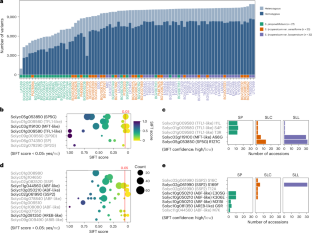Repairing a deleterious domestication variant in a floral regulator gene of tomato by base editing
IF 31.7
1区 生物学
Q1 GENETICS & HEREDITY
引用次数: 0
Abstract
Crop genomes accumulate deleterious mutations—a phenomenon known as the cost of domestication. Precision genome editing has been proposed to eliminate such potentially harmful mutations; however, experimental demonstration is lacking. Here we identified a deleterious mutation in the tomato transcription factor SUPPRESSOR OF SP2 (SSP2), which became prevalent in the domesticated germplasm and diminished DNA binding to genome-wide targets. We found that the action of SSP2 is partially redundant with that of its paralog SSP in regulating shoot and inflorescence architecture. However, redundancy was compromised during tomato domestication and lost completely in the closely related species Physalis grisea, in which a single ortholog regulates shoot branching. We applied base editing to directly repair the deleterious mutation in cultivated tomato and obtained plants with compact growth that provide an early fruit yield. Our work shows how deleterious variants have sensitized modern genotypes for phenotypic tuning and illustrates how repairing deleterious mutations with genome editing may allow predictable crop improvement. A deleterious mutation in the tomato transcription factor SSP2 was enriched during domestication. Repairing the deleterious mutation in cultivated tomato by base editing leads to compact growth and early fruit yield.


利用碱基编辑修复番茄花调节基因的有害驯化变异
作物基因组积累了有害的突变,这种现象被称为驯化成本。有人提出精确的基因组编辑来消除这种潜在的有害突变;然而,缺乏实验证明。研究人员在番茄SP2转录因子抑制因子(SSP2)中发现了一个有害突变,该突变在驯化种质中普遍存在,并减少了DNA与全基因组靶点的结合。我们发现SSP2在调节茎部和花序结构方面的作用与其平行的SSP部分重复。然而,在番茄驯化过程中,冗余性受到损害,在密切相关的品种灰Physalis grisea中完全失去了冗余性,在灰Physalis grisea中,单个同源物调节茎枝分支。我们应用碱基编辑直接修复了栽培番茄的有害突变,获得了生长紧凑的植株,提供了早期的果实产量。我们的工作显示了有害变异如何使现代基因型对表型调整敏感,并说明了通过基因组编辑修复有害突变如何可能实现可预测的作物改良。
本文章由计算机程序翻译,如有差异,请以英文原文为准。
求助全文
约1分钟内获得全文
求助全文
来源期刊

Nature genetics
生物-遗传学
CiteScore
43.00
自引率
2.60%
发文量
241
审稿时长
3 months
期刊介绍:
Nature Genetics publishes the very highest quality research in genetics. It encompasses genetic and functional genomic studies on human and plant traits and on other model organisms. Current emphasis is on the genetic basis for common and complex diseases and on the functional mechanism, architecture and evolution of gene networks, studied by experimental perturbation.
Integrative genetic topics comprise, but are not limited to:
-Genes in the pathology of human disease
-Molecular analysis of simple and complex genetic traits
-Cancer genetics
-Agricultural genomics
-Developmental genetics
-Regulatory variation in gene expression
-Strategies and technologies for extracting function from genomic data
-Pharmacological genomics
-Genome evolution
 求助内容:
求助内容: 应助结果提醒方式:
应助结果提醒方式:


